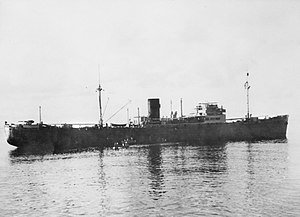1941: German Q-Ship Pinguin Sinks
On May 8th, 1941, a significant event took place in the Indian Ocean during World War II. The German Q-ship Pinguin, disguised as a harmless merchant vessel, was sunk by the British cruiser HMS Cornwall. This incident not only marked the end of the Pinguin’s successful raiding of Allied merchant ships but also resulted in a significant loss of life.
The German Q-Ship Pinguin
The Pinguin was a German auxiliary cruiser, also known as a Q-ship, which was designed to deceive enemy vessels by disguising itself as a harmless merchant ship. These Q-ships played a crucial role in the German Navy’s strategy during World War II, as they were able to surprise and attack unsuspecting Allied vessels.
The Pinguin had been operating in the Indian Ocean for several months, successfully raiding and capturing numerous Allied merchant ships. Its disguise allowed it to approach unsuspecting vessels before revealing its true identity and launching an attack. The captured vessels were either sunk or used to transport captured goods back to Germany.
The Sinking of the Pinguin
However, on May 8th, 1941, the Pinguin’s luck ran out. The British cruiser HMS Cornwall, while on patrol in the Indian Ocean, spotted the disguised Q-ship and recognized its true nature. Realizing the threat it posed to Allied shipping, the Cornwall engaged the Pinguin in battle.
The ensuing battle between the Pinguin and the Cornwall was fierce. Despite the Pinguin’s attempts to defend itself, the superior firepower of the Cornwall proved too much to overcome. The Pinguin was eventually sunk, putting an end to its successful raiding operations.
Loss of Life and Prisoners
The sinking of the Pinguin resulted in a significant loss of life. Both German crew members and prisoners from the captured vessels were onboard the Q-ship at the time of its sinking. The exact number of casualties is uncertain, but it is estimated that over 350 people lost their lives in the incident.
Among the prisoners onboard the Pinguin were individuals from various nationalities, including British, Dutch, Norwegian, and Greek. The sinking of the Pinguin not only ended their captivity but also marked a tragic end to their ordeal.
Historical Significance
The sinking of the Pinguin had significant implications for both the German Navy and the Allied forces. It highlighted the vulnerability of the Q-ship strategy and the importance of effective naval patrols in protecting merchant vessels.
Furthermore, the sinking of the Pinguin served as a reminder of the risks faced by those involved in naval warfare during World War II. The loss of life, both German and Allied, underscored the human cost of the conflict.
Today, the sinking of the Pinguin remains a notable event in naval history. It serves as a reminder of the ingenuity and adaptability of both the German and Allied forces during World War II.
For further information on the sinking of the Pinguin and its historical context, you can refer to the following external references:
These references provide additional insights and details about the events surrounding the sinking of the Pinguin and its impact on World War II.

